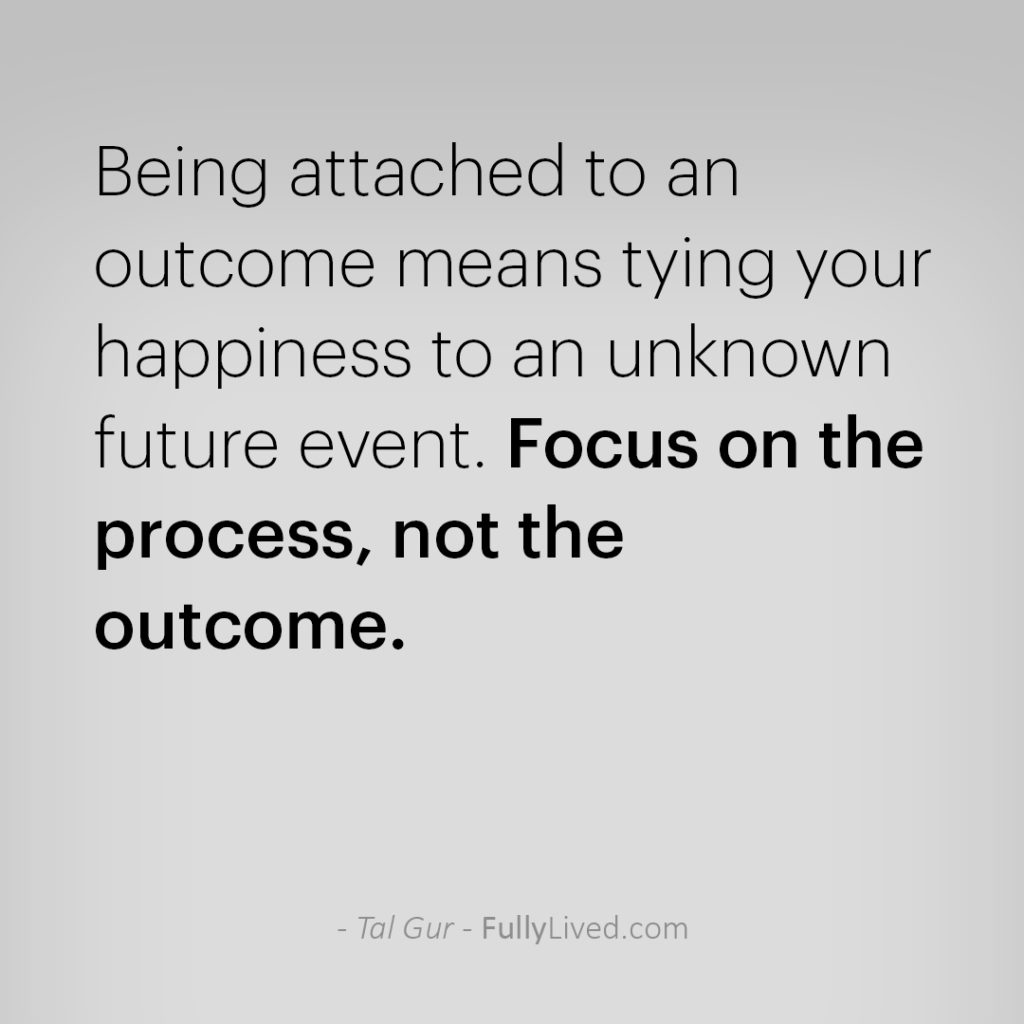Being attached to an outcome means tying your happiness to an unknown future event. Focus on the process, not the outcome.
The message conveyed by the quote "Being attached to an outcome means tying your happiness to an unknown future event. Focus on the process, not the outcome" is both insightful and thought-provoking. In essence, it encourages a shift in perspective, urging individuals to detach themselves from the uncertainties of the future and instead concentrate on the present moment.
At times, we find ourselves excessively fixated on the end result, pinning our happiness and contentment solely on the achievement of a particular outcome. Whether it's landing a dream job, attaining a personal goal, or even seeking validation from others, we tend to tie our emotional well-being to these future events. However, this attachment can become problematic, as it places our happiness in a state of uncertainty. We become prisoners of an unpredictable future, constantly anxious and longing for that which is yet to materialize.
By emphasizing the importance of focusing on the process rather than the outcome, the quote presents an alternative approach to living a fulfilling life. It encourages us to redirect our attention to the present moment, appreciating and immersing ourselves fully in the journey itself. The process encompasses the actions, efforts, and experiences we encounter along the way. It embodies the learning, growth, and self-discovery that arise as we navigate the intricacies of life.
Shifting our focus to the process offers several profound benefits. First and foremost, it allows us to find joy and fulfillment in the present, rather than constantly deferring our happiness to an uncertain future. By being fully present and engaged in what we are doing, we can savor the beauty and richness of each moment, regardless of the outcome. This not only enhances our overall well-being but also cultivates a sense of gratitude for the journey itself.
Moreover, by emphasizing the process, we liberate ourselves from the suffocating pressure that often accompanies the attachment to outcomes. When we are fixated on a specific result, we tend to become rigid and fearful, paralyzed by the fear of failure or disappointment. However, when we shift our attention to the process, we open ourselves up to possibilities, creativity, and flexibility. We become more adaptable, willing to embrace challenges and learn from setbacks, recognizing that they are all part of the transformative journey toward our desired destination.
In a world that often glorifies instant gratification and instant results, the quote reminds us of the significance of patience and persistence. It encourages us to trust in the process, understanding that it is through consistent effort and dedication that we can truly grow and evolve. The outcome becomes a natural byproduct of our commitment to the process, rather than the sole determinant of our happiness.
In conclusion, the message behind the quote invites us to reevaluate our relationship with outcomes and adopt a more mindful and empowering approach to life. By focusing on the process, we free ourselves from the uncertainties of the future, finding contentment and fulfillment in the present. It is through embracing the journey, learning from challenges, and remaining dedicated that we can truly create a meaningful and purposeful life.
Is there a historical example that illustrates the message of the quote?
One example is the story of Thomas Edison and the invention of the electric light bulb.
Thomas Edison made numerous attempts to develop a practical electric light bulb. He faced countless failures and setbacks along the way. Despite these challenges, Edison maintained his focus on the process of experimentation and innovation, rather than becoming solely attached to the outcome of successfully inventing the light bulb.
Edison famously said, "I have not failed. I've just found 10,000 ways that won't work." He recognized that each unsuccessful attempt was a valuable learning experience that brought him closer to his goal. By concentrating on the process and continuously iterating his experiments, Edison eventually achieved success and invented the practical electric light bulb.
Edison's example demonstrates the importance of detaching oneself from the outcome and instead focusing on the process. If he had been solely fixated on the end result, he might have given up after facing repeated failures. However, by embracing the journey and learning from each setback, he was able to persevere and achieve a groundbreaking invention.
This historical example serves as a reminder that attaching our happiness solely to the outcome of a specific event can lead to disappointment and frustration. Instead, by embracing the process, learning from our experiences, and finding joy in the journey itself, we can maintain a positive mindset and increase our chances of eventual success.

* If you’re seeking extra motivation and inspiration on your journey of personal growth, I recommend taking a look at my SMART growth goals page, This page offers thousands of goal ideas that can assist in the establishment of new aspirations and the attainment of greater heights in one's life. In fact, it was instrumental in my creation of a list of 100 goals, which I pursued for a decade.
Chief Editor
 Tal Gur is an author, founder, and impact-driven entrepreneur at heart. After trading his daily grind for a life of his own daring design, he spent a decade pursuing 100 major life goals around the globe. His journey and most recent book, The Art of Fully Living, has led him to found Elevate Society.
Tal Gur is an author, founder, and impact-driven entrepreneur at heart. After trading his daily grind for a life of his own daring design, he spent a decade pursuing 100 major life goals around the globe. His journey and most recent book, The Art of Fully Living, has led him to found Elevate Society.




















